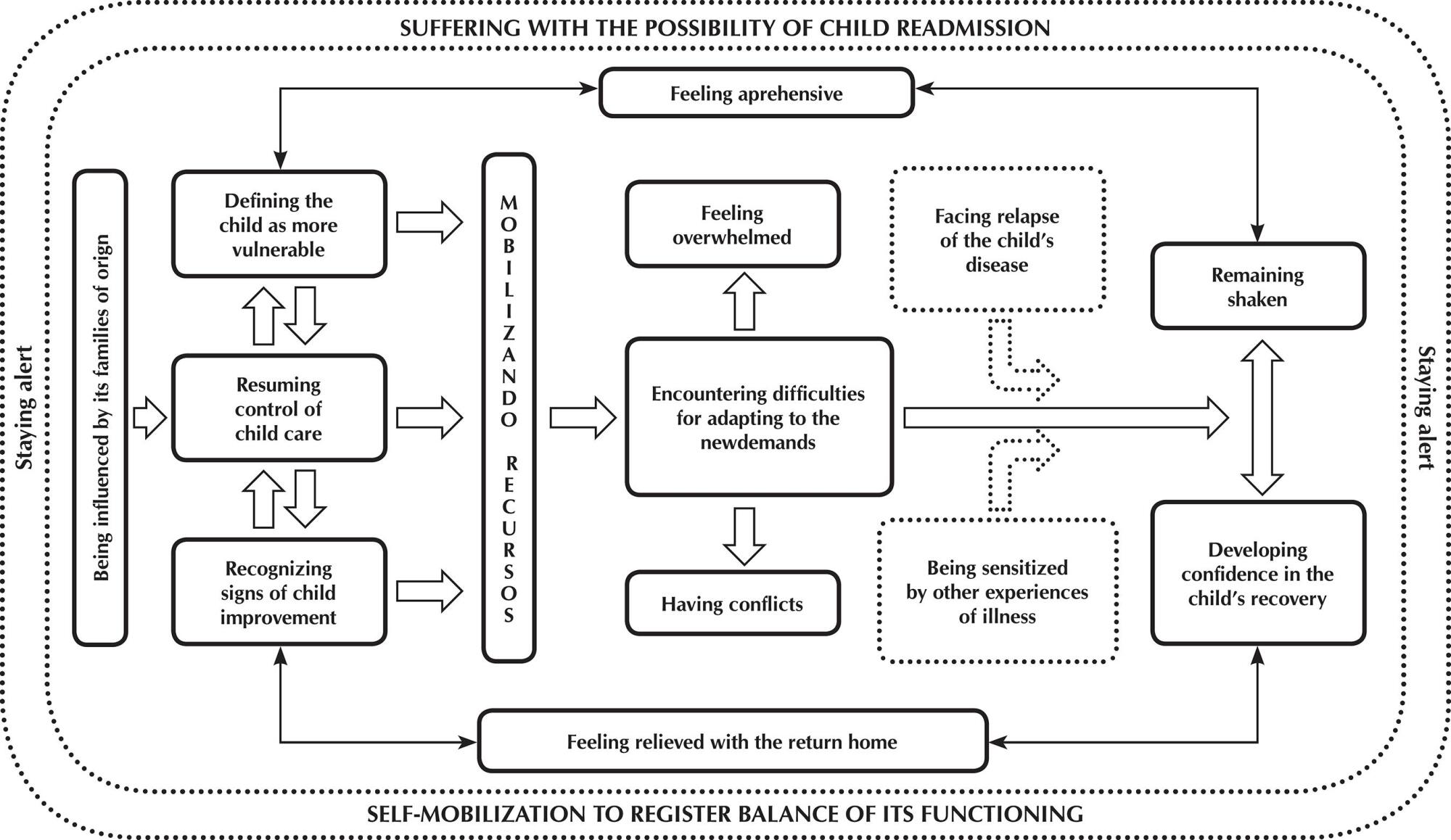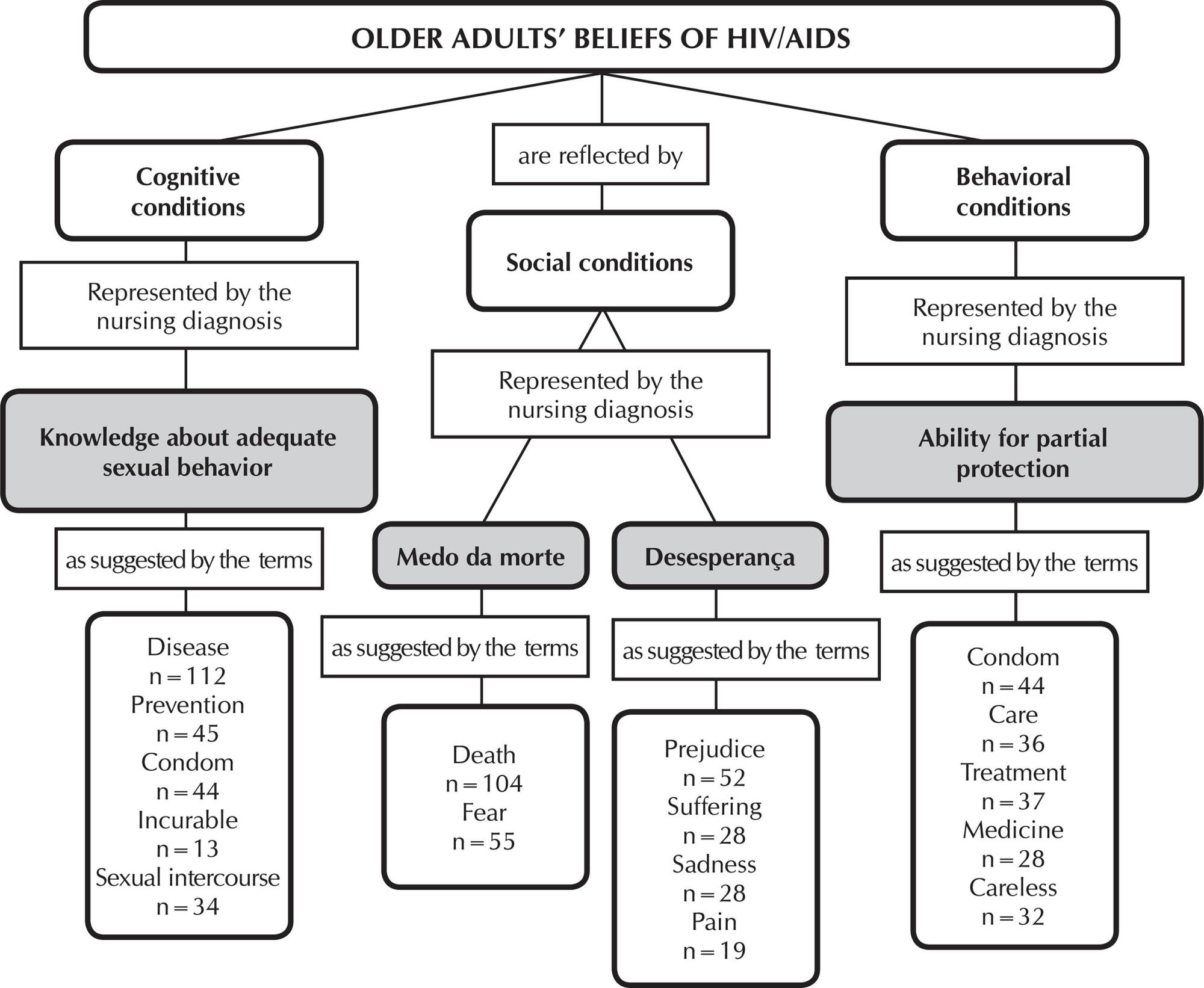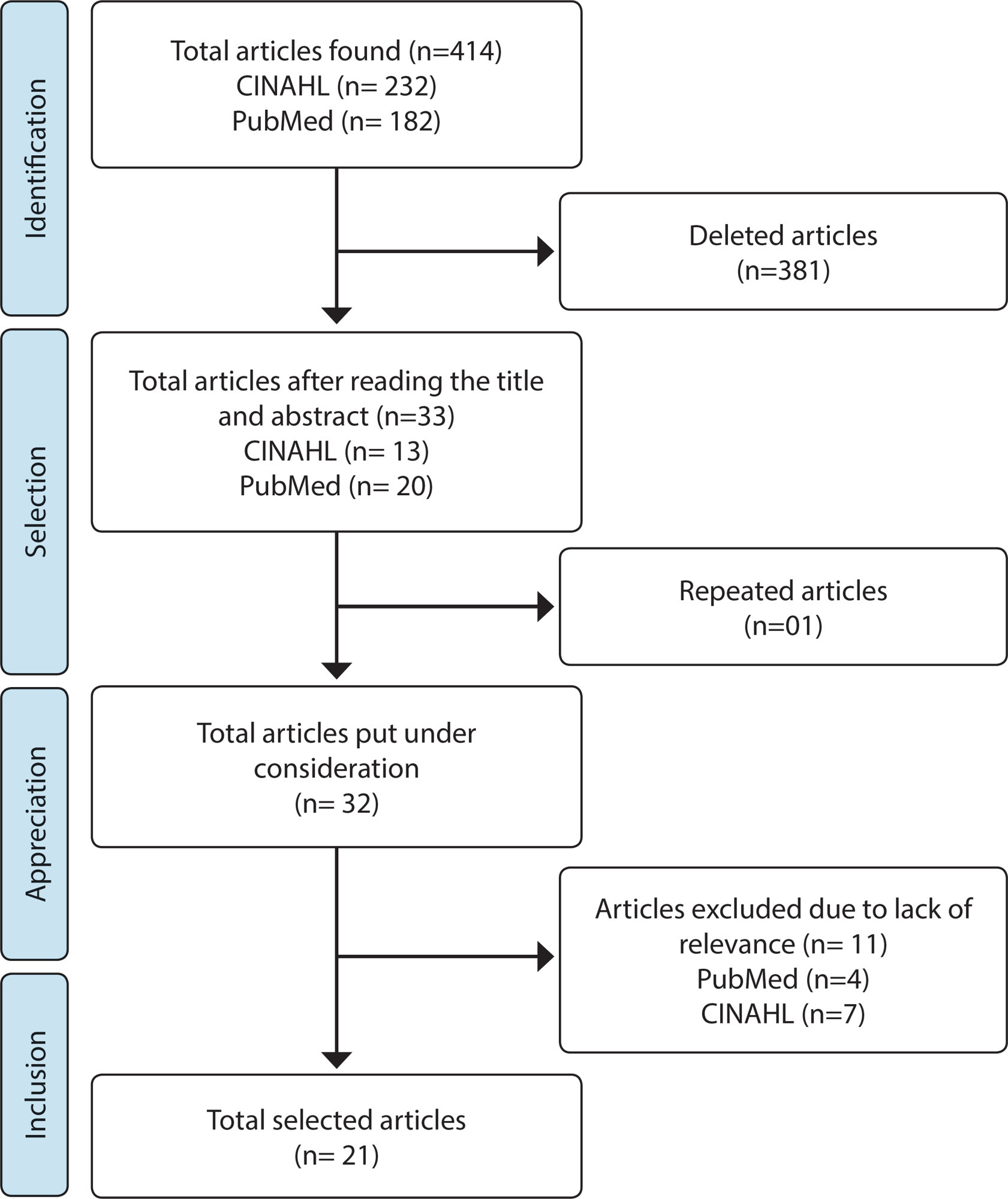-
01-01-2015
Social representations about religion and spirituality
Revista Brasileira de Enfermagem. 2015;68(4):609-616
Abstract
Social representations about religion and spirituality
Revista Brasileira de Enfermagem. 2015;68(4):609-616
DOI 10.1590/0034-7167.2015680406i
Views0See moreABSTRACT
Objective:
to identify the social representations about the concepts of spirituality and religion of of health teachers.
Method:
exploratory and descriptive study, based on a qualitative approach. 25 subjects participated in it. The following instruments were used to collect data: questionnaire to identify the profile; questionnaire of free association, whose inducing words were religion and spirituality, and an interview based on the scale FICA (Puchalski, 2006).
Results:
the representations about religion and spirituality, for professors, are forged around the faith in God and it gives them meaning and purpose to deal with the challenges of personal and professional living.
Conclusion:
there are still barriers that need to be overcome with a view to a comprehensive care. For this, it is essential to incorporate spirituality in the process in the curricula of health courses.

-
01-01-2015
Prevalence and factors associated with smoking among tobacco growers in southern Brazil
Revista Brasileira de Enfermagem. 2015;68(4):603-608
Abstract
Prevalence and factors associated with smoking among tobacco growers in southern Brazil
Revista Brasileira de Enfermagem. 2015;68(4):603-608
DOI 10.1590/0034-7167.2015680405i
Views0See moreABSTRACT
Objective:
identify the prevalence and factors associated with smoking in tobacco growers.
Method:
descriptive, cross-sectional research. Data collection occurred in 2012 through household survey and interviews, including application of a structured instrument and scale Fargeström.
Results:
there were 100 growers included, average age of 46,9 ± 10,8 years; 90(90%) married; 72(72%) white, average family composition 3,7±1,1 people; median number of children 3(1-3), and the average study time 6±2,5. The prevalence of smoking among tobacco growers was 17%, which had less education (p=0.010) and fewer people in the household (p=0.049).
Conclusion:
the prevalence of smoking among tobacco growers was higher than the national average, but the nicotine dependence was low, which can facilitate the smoking cessation process. Highlights the need to implement a program to control smoking among tobacco growers.
-
01-01-2015
The family living the child recovery process after hospital discharge
Revista Brasileira de Enfermagem. 2015;68(4):594-602
Abstract
The family living the child recovery process after hospital discharge
Revista Brasileira de Enfermagem. 2015;68(4):594-602
DOI 10.1590/0034-7167.2015680404i
Views1See moreABSTRACT
Objective:
to understand the meaning attributed by the family to its experience in the recovery process of a child affected by an acute disease after discharge, and to develop a theoretical model of this experience. Symbolic interactionism was adopted as a theoretical reference, and grounded theory was adopted as a methodological reference.
Method:
data were collected through interviews and participant observation with 11 families, totaling 15 interviews. A theoretical model consisting of two interactive phenomena was formulated from the analysis: Mobilizing to restore functional balance and Suffering from the possibility of a child’s readmission.
Results:
the family remains alert to identify early changes in the child’s health, in an attempt to avoid rehospitalization.
Conclusion:
the effects of the disease and hospitalization continue to manifest in family functioning, causing suffering even after the child’s discharge and recovery.

-
01-01-2015
Multiprofessional residency in health: a document analysis of political pedagogical projects
Revista Brasileira de Enfermagem. 2015;68(4):586-593
Abstract
Multiprofessional residency in health: a document analysis of political pedagogical projects
Revista Brasileira de Enfermagem. 2015;68(4):586-593
DOI 10.1590/0034-7167.2015680403i
Views0See moreABSTRACT
Objective:
To analyze MPRH political pedagogical projects (PPP) developed in the state of São Paulo and identify scenarios that are highly favorable to IPE.
Method:
This was a descriptive exploratory study conducted through document analysis.
Results:
The analysis revealed a heterogeneous scenario regarding the curricula, didactic and pedagogical organization, educational objectives, pedagogical matrices and evaluation systems employed. One of the programs was identified as providing a highly favorable setting for IPE.
Conclusion:
The analysis adequately evaluated IPE in educational settings and found a highly favorable scenario for it, identifying didactic, pedagogical, political and organizational MPRH elements.
-
01-01-2015
Beliefs of older adults about their vulnerability to HIV/Aids, for the construction of nursing diagnoses
Revista Brasileira de Enfermagem. 2015;68(4):579-585
Abstract
Beliefs of older adults about their vulnerability to HIV/Aids, for the construction of nursing diagnoses
Revista Brasileira de Enfermagem. 2015;68(4):579-585
DOI 10.1590/0034-7167.2015680402i
Views0See moreABSTRACT
Objective:
to know the beliefs of older adults about their vulnerability to HIV/Aids, and to identify nursing diagnoses.
Method:
a field research implemented in Family Health Units, in João Pessoa, Brazil. The sample included 250 older adults of both genders with data collected from April to July of 2011. A Test of Free Word Association was applied using the term HIV/Aids. A content analysis and cross-mapping of the most frequent terms with the International Classification for Nursing Practice, 2011 were performed.
Results:
202 terms were identified in terms, with an overall frequency of 1156. Of the 202 terms, 16 were more frequent and were used to construct the nursing diagnoses. The diagnoses identified were knowledge about appropriate sexual behavior, ability for partial protection, fear of death and hopelessness.
Conclusion:
understanding these beliefs drew from knowledge about factors related to, vulnerability to HIV/Aids aimed at planning health care actions for this population segment.

-
LETTER TO THE EDITOR01-01-2015
Considerations about the manuscript published
Revista Brasileira de Enfermagem. 2015;68(4):577-577
Abstract
LETTER TO THE EDITORConsiderations about the manuscript published
Revista Brasileira de Enfermagem. 2015;68(4):577-577
DOI 10.1590/0034-7167.20156804c
Views0Re: Chinese auriculotherapy to improve quality of life of nursing team To the Editor,[…]See more -
01-01-2015
A Pesquisa em Enfermagem e os novos rumos a partir do SENPE
Revista Brasileira de Enfermagem. 2015;68(4):571-572
Abstract
A Pesquisa em Enfermagem e os novos rumos a partir do SENPE
Revista Brasileira de Enfermagem. 2015;68(4):571-572
DOI 10.1590/0034-7167.2015680401i
Views0Após quase meio século do início da pesquisa em Enfermagem no Brasil, ainda há necessidade de investimentos para considerá-la consolidada. Os seminários nacionais que discutem a investigação nesta área demonstram esta afirmação ao longo de 17 eventos, por seus resultados e participação da categoria de pesquisadores e prestadores de serviço.O 18º Seminário Nacional de Pesquisa […]See more
-
ORIGINAL ARTICLE09-21-2020
Family management ofchildren who experience sickle cell disease: a qualitative study
Revista Brasileira de Enfermagem. 2020;73:e20190521
Abstract
ORIGINAL ARTICLEFamily management ofchildren who experience sickle cell disease: a qualitative study
Revista Brasileira de Enfermagem. 2020;73:e20190521
DOI 10.1590/0034-7167-2019-0521
Views1See moreABSTRACT
Objective:
to know the family management experience of children with sickle cell disease in the light of the Family Management Style Framework.
Methods:
a qualitative case study carried out between September/2015 and July/2016 with 12 members of eight families registered in a blood center in Minas Gerais. The semi-structured interviews were recorded, and the data were analyzed and interpreted by the hybrid model thematic analysis.
Results:
three management styles were identified: five families in the accommodating style; two families in the struggling style; and only one family in the enduring style.It was noted that empowerment was paramount in the acquisition of skills and abilities to care for these children.
Final considerations:
family management knowledge of children with sickle cell disease provided a reflection on nurses’ role in supporting, orienting and encouraging the empowerment of these families aiming at the search for comprehensive care.
-
ORIGINAL ARTICLE09-16-2019
Spatial analysis on tuberculosis and the network of primary health care
Revista Brasileira de Enfermagem. 2019;72(5):1197-1202
Abstract
ORIGINAL ARTICLESpatial analysis on tuberculosis and the network of primary health care
Revista Brasileira de Enfermagem. 2019;72(5):1197-1202
DOI 10.1590/0034-7167-2017-0897
Views1See moreABSTRACT
Objective:
to analyze the spatial distribution of new cases of tuberculosis compared to the location of the Primary Healthcare Units that performed the compulsory notification.
Method:
ecological study conducted in Belém, Pará, with 5,294 new cases of tuberculosis notified to Sistema de Informação de Agravos de Notificação for the period from 2010 to 2014. The cases were georeferenced using the software applications ArcGis 10.2 and TerraView 4.2.2. The techniques of Kernel density and global Moran geostatistics were used.
Results:
the incidence of tuberculosis cases did not vary significantly between the years studied, however there was a variation in incidence between neighborhoods. Health units that exhibited higher number of notifications can suffer great influence of migration from nearby neighborhoods.
Conclusion:
the spatial dynamics of tuberculosis associated with health services allows to know the areas with increased risk of tuberculosis and the density of notifications of health units.

-
04-16-2021
Questionnaire for assessing patient safety culture in emergency services: an integrative review
Revista Brasileira de Enfermagem. 2021;74(2):e20190693
Abstract
Questionnaire for assessing patient safety culture in emergency services: an integrative review
Revista Brasileira de Enfermagem. 2021;74(2):e20190693
DOI 10.1590/0034-7167-2019-0693
Views0See moreABSTRACT
Objective:
to identify the instruments used to assess patient safety culture in emergency settings.
Method:
an integrative literature review conducted from 2000 to 2018.
Results:
13 instruments were identified to assess patient safety culture in hospital and pre-hospital emergencies, comprising 12 to 50 questions, grouped from three to 12 dimensions, with dimensions related to teamwork, support, and management actions for patient safety and for continuous process improvement and continuing education. The Emergency Medical Service Safety Attitude Questionnaire, which is exclusive for pre-hospital care, stands out.
Conclusions:
the choice and the best decision regarding the instrument are linked to the objectives, the environment and the population to be investigated, as well as the instrument’s reliability.

-
05-21-2021
Pleasure and suffering in the work of nurses at the oncopediatric hospital unit: qualitative research
Revista Brasileira de Enfermagem. 2021;74:e20200735
Abstract
Pleasure and suffering in the work of nurses at the oncopediatric hospital unit: qualitative research
Revista Brasileira de Enfermagem. 2021;74:e20200735
DOI 10.1590/0034-7167-2020-0735
Views0See moreABSTRACT
Objective:
To analyze the experiences that generate pleasure and suffering in the work of nurses in an oncopediatric inpatient unit.
Methods:
Qualitative, exploratory, descriptive study. Data collection took place from March to May 2018, through interviews with eight nurses in an oncopediatric inpatient unit.
Results:
The verbalized experiences of pleasure were the work developed with children, participation in the treatment and cure of patients and the recognition of family members in relation to the work performed. The suffering experiences were palliative care and death of patients, performing invasive procedures and organizing work.
Final considerations:
It was possible to analyze the experiences of pleasure and suffering of nurses in an oncopediatric unit through the psychodynamics of work, allowing to reinvent prevention and intervention measures by managers in health/mental illness processes at work.
-
REVIEW09-21-2020
Postnatal care of newborns in the family context: an integrative review
Revista Brasileira de Enfermagem. 2020;73:e20190454
Abstract
REVIEWPostnatal care of newborns in the family context: an integrative review
Revista Brasileira de Enfermagem. 2020;73:e20190454
DOI 10.1590/0034-7167-2019-0454
Views0See moreABSTRACT
Objective:
to analyze the postnatal care practices of newborns in the family context from the scientific literature.
Methods:
the searches of the integrative literature review were carried out in the Latin American and Caribbean Literature in Health Sciences (LILACS), Nursing Database (BDENF), Scientific Electronic Library Online (SciELO), and U.S. National Library of Medicine (PubMed) databases.
Results:
sixteen studies composed the final sample and, from these, two analytical categories emerged: Practices and doubts of families in postnatal care of newborns; and Best practices in postnatal care of newborns.
Final considerations:
several cultural practices of families differ from scientific recommendations, which can generate risks to the health of newborns. Therefore, it is essential to consolidate educational programs with family members, to improve the quality of care offered and to reduce preventable neonatal deaths in different socio-family contexts.

-
ORIGINAL ARTICLE03-07-2022
Predictors of frailty in older people users of Primary Health Care
Revista Brasileira de Enfermagem. 2022;75:e20201292
Abstract
ORIGINAL ARTICLEPredictors of frailty in older people users of Primary Health Care
Revista Brasileira de Enfermagem. 2022;75:e20201292
DOI 10.1590/0034-7167-2020-1292
Views0See moreABSTRACT
Objective:
to identify the prevalence and predictors of frailty in older people in Primary Health Care.
Method:
this is a descriptive and correlational study, carried out in a convenience sample of 136 older people in the community. Data were collected through a sociodemographic and clinical questionnaire and frailty phenotype. Student’s t test or U-Mann-Whitney test, chi-square and binary logistic regression were used for data analysis.
Results:
the prevalence of frailty was 26.5% (n=36). Frail individuals had older age (p=0.011), worse self-rated health (p=0.001) and lower physical capacity (p<0.001). In the multivariable regression, it was observed that frail individuals had older age (Odds Ratio=1.111; 95% confidence interval=1.026-1.203) and worse physical capacity (Odds Ratio=0.673; 95% confidence interval=0.508-0.893).
Conclusions:
the prevalence of frailty in older people in Primary Health Care was considerable. Advanced age and worse physical capacity were the most relevant predictors of frailty in the elderly.
-
REFLECTION03-24-2021
Workplace violence: legislation, public policies and possibility of advances for health workers
Revista Brasileira de Enfermagem. 2021;74(1):e20200335
Abstract
REFLECTIONWorkplace violence: legislation, public policies and possibility of advances for health workers
Revista Brasileira de Enfermagem. 2021;74(1):e20200335
DOI 10.1590/0034-7167-2020-0335
Views0See moreABSTRACT
Objectives:
to discuss specific laws and public policies for workplace violence in the health sector, highlighting possibilities for the collective confrontation of this phenomenon in Brazil.
Methods:
this is a reflective and argumentative study that refers to some previous experiences regarding the implementation of legal aspects to curb workplace violence directed at health professionals.
Results:
there are experiences regarding the existence of legislation or public policies to specifically contain workplace violence in the health sector, but these are still restricted to some places or countries. The literature provides resources for developing specific strategies for managing this phenomenon, highlighting prevention programs and conducts for case management.
Final Considerations:
implementation of legal aspects or public policies at the municipal, regional, state and/or national level is a strategy with potential to confront workplace violence in health services in a collective and sustainable way.
-
09-16-2019
Tuberculosis: knowledge among nursing undergraduate students
Revista Brasileira de Enfermagem. 2019;72(5):1279-1287
Abstract
Tuberculosis: knowledge among nursing undergraduate students
Revista Brasileira de Enfermagem. 2019;72(5):1279-1287
DOI 10.1590/0034-7167-2018-0384
Views0See moreABSTRACT
Objective:
To analyze the knowledge about tuberculosis among nursing undergraduate students of a Federal Higher Education Institution.
Method:
Descriptive cross-sectional study, with quantitative approach. Data were collected through a questionnaire based on the WHO’s guide to developing evaluation instruments on knowledge, attitudes and practices related to TB. Students were classified as “with knowledge” and “with little knowledge” based on the mean percentage of correct responses to the variables analyzed. Descriptive statistics techniques were used.
Results:
60 nursing students were interviewed. “with little knowledge” was observed among students who were studying at the university for less time and who had no previous contact with the subject, and “with knowledge” was observed among those whose knowledge about tuberculosis was acquired in the health services.
Conclusion:
Knowledge gaps among undergraduate nursing students were identified, suggesting the need to rethink teaching-learning strategies on the subject.
Search
Search in:
Nuvem de Tags
Adolescente (85) Atenção Primária à Saúde (239) COVID-19 (91) Criança (91) Cuidados de Enfermagem (269) Educação em Enfermagem (151) Educação em Saúde (139) Enfermagem (930) Enfermagem Pediátrica (86) Estudantes de Enfermagem (77) Estudos de Validação (131) Família (87) Idoso (208) Promoção da Saúde (99) Qualidade de Vida (104) Saúde do Trabalhador (86) Saúde Mental (145) Saúde Pública (82) Segurança do Paciente (150) Tecnologia Educacional (100)



